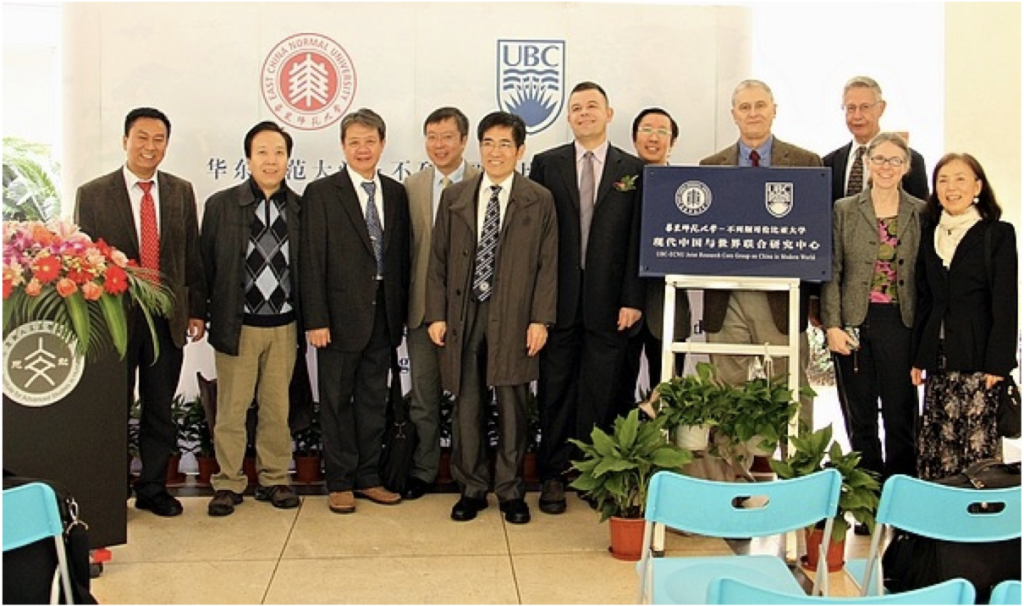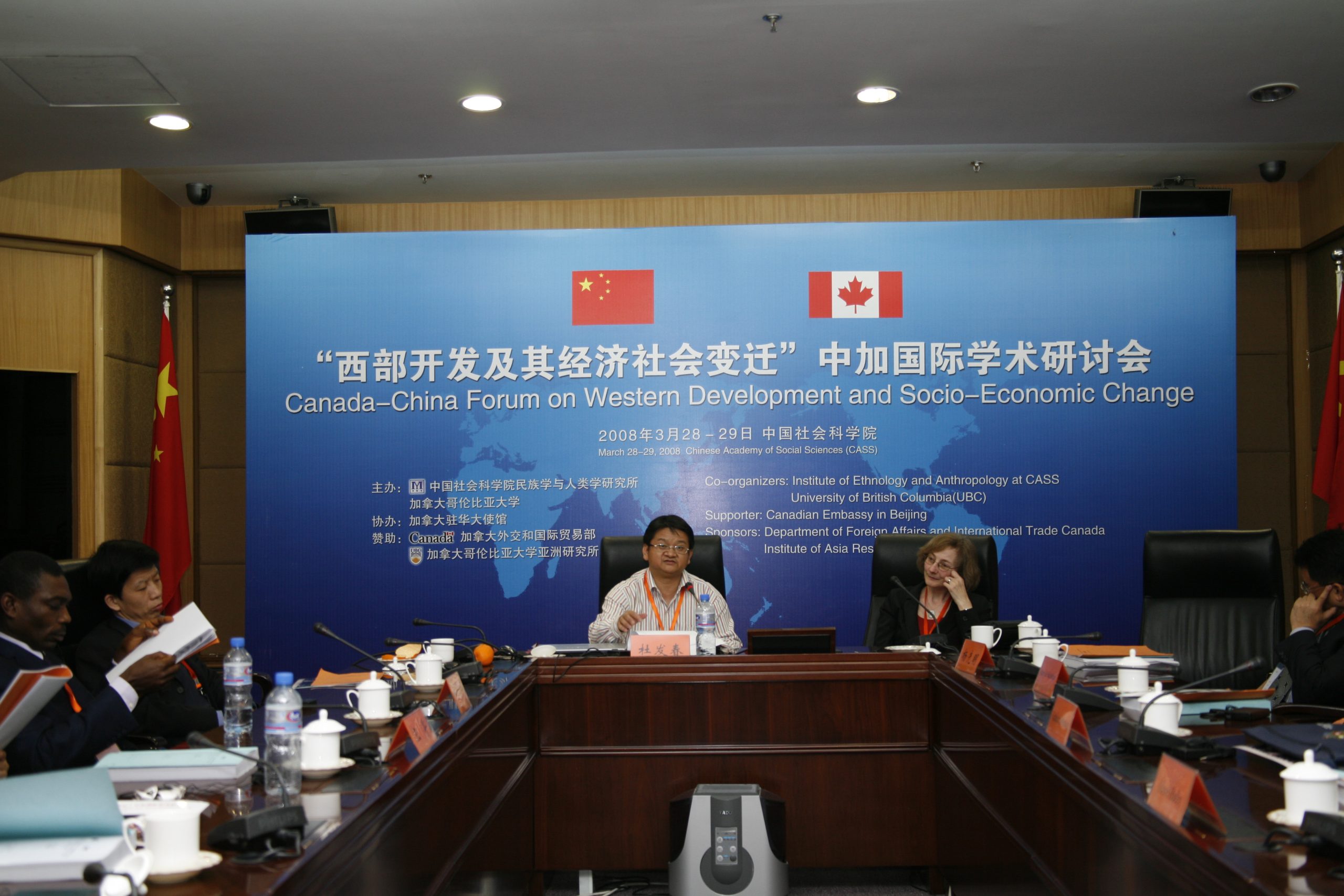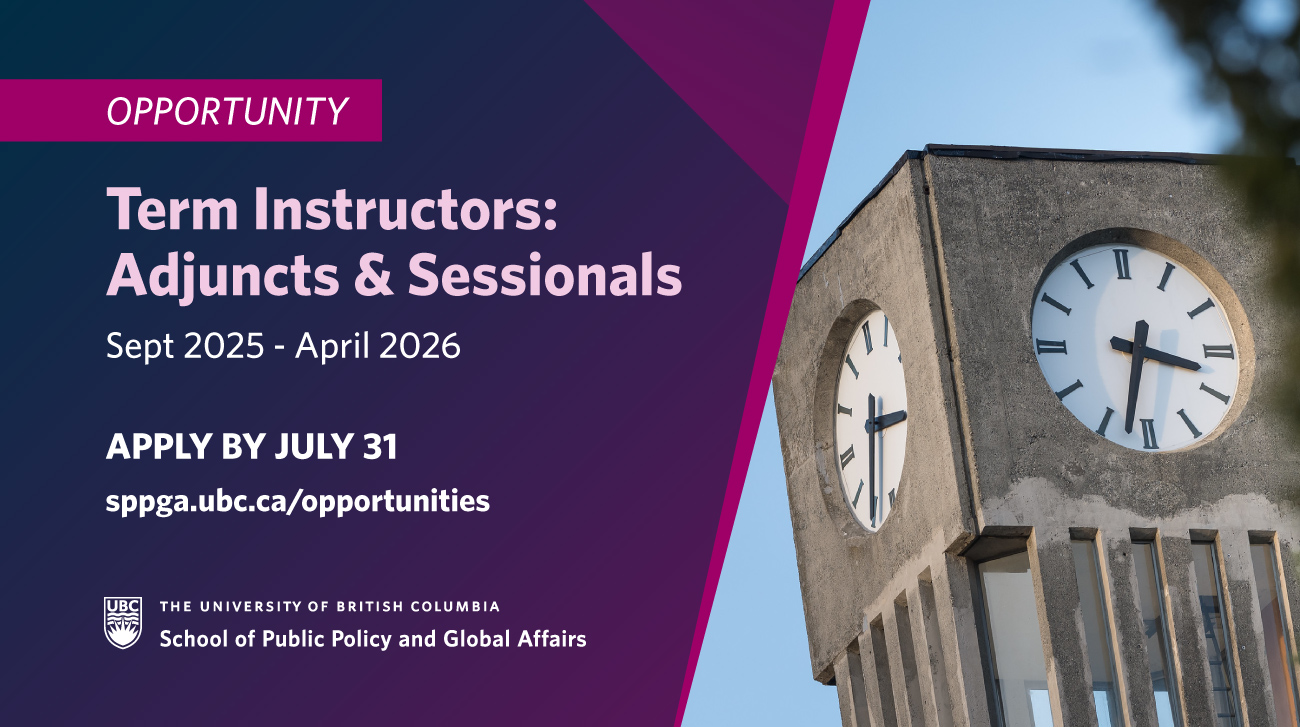

CCR Members at the Unveiling of the ECNU-UBC Joint Centre, Shanghai, November 2012
The Centre for Chinese Research (CCR) at the University of British Columbia has a rich history of fostering academic, cultural, and professional ties between Canada and the Sinophone world. CCR’s commitment to living Chinese culture and social life is reflected in the Chinese name for the Centre 中華研究中心 or “Zhonghua”— which is also the cultural name for China.
Over the years CCR has benefited from generous philanthropic support which has furthered its research capabilities and outreach. In the 1990s, the original donation for the Institute of Asian Research by the Choi Family included support for building space for the Centre. Likewise, the renowned Hong Kong based author Louis Cha Leung-yung GBM OBE 查良鏞 (1924-2018), known by his pen name Jin Yong 金庸. , endowed the Louis Cha Chair professorship. This generous donation has supported research on contemporary thought and society in China, as well as Chinese environmental sciences and sustainability. Since 2002, the Louis Cha Chair has been held by Professor Timothy Cheek (co-director of CCR).
Early Initiatives for Chinese Studies at UBC
UBC’s engagement with China started in 1915, when it welcomed its first student of Chinese ancestry. By 1933, UBC awarded its first honorary degree to the Chinese scholar Dr. Weng Wenhao 翁文灝 (1889-1971). These early interactions led to long-term academic relationships, including the post-war expansion of China-related programs. In 1948, the history department introduced the first Chinese history course taught by Professor Ho Ping-ti. The arrival of William Holland in 1961 saw creation of the Department of Asian Studies and the arrival of the major journal, Pacific Affairs which he had been editing for the Institute of Pacific Relations. These developments further committed UBC to Chinese studies. A 1980 partnership with Peking University initiated formal academic exchanges, enhancing research, student mobility, and faculty exchanges.
1992-2000: Laying the Foundations of CCR
The Centre for Chinese Research was formally established in 1992 as part of the Institute of Asian Research (IAR) to strengthen Chinese studies, coordinate multidisciplinary research efforts, and broaden the understanding of China within the Canadian context. From its inception, CCR has been at the forefront of hosting a multitude of scholarly activities, including workshops, seminars, conferences, and research publications that delve into the complex socio-political landscapes of China. It has also established robust relationships with numerous Chinese universities and research institutions, thereby enriching UBC’s stature as a critical source of expertise on China in Canada.
Events organized by the Centre for Chinese Research (CCR) at UBC focused on China’s social, economic, and political transitions, consistently drawing large audiences from both within and beyond the UBC community. Faculty associated with the Centre also engaged in significant scholarly activities in China. In the mid-1990s, Professor He Baoshan (Samuel Ho, 何保山), an economist and then CCR director, initiated a collaboration with the Jiangsu Academy of Social Science (CASS) focusing on rural non-agricultural development.
With funding from the International Development and Research Centre of Canada (IDRC), Professor Samuel Ho led a partnership on three major projects with CASS. One notable project spanned 12 southern provinces of China, aiming to train young economists and policymakers through applied research on crucial development issues. This initiative supported around 300 researchers from 22 institutions, providing them with essential data, skills, and information for both current and future research endeavors. Their findings were compiled in a publication titled Sustainable Economic Development in South China (2000).

A forum held in collaboration with the Chinese Academy of Social Sciences, 2008

A forum held in collaboration with the Chinese Academy of Social Sciences, 2008
2000-2020: Building Cross-Regional Partnerships in China and Beyond
In the 2000s, Professor Pitman Potter, then Director of the IAR, continued advanced engagement with China for the CCR in the legal field, hosting two major SSHRC MCRI projects on “Asia Pacific Dispute Resolution” that built decade-long collaborations with universities in China, Japan, the US, and Europe and produced a half-dozen books and a score of research articles from the project members. Professor Diana Lary as director in the 2000s especially built research and exchange projects with scholars in Hong Kong and Taiwan. In the 2010s Professor Timothy Cheek built scholarly and graduate exchanges with PRC scholars, particularly East China Normal University in our “Joint Core Group on Modern China in the World” which continues to host graduate student exchange training and regular scholarly meetings and publications. Through the challenges of the Covid-19 pandemic and at present, the Centre for Chinese Research works to maintain all possible academic contact and exchanges during a time of geopolitical tensions.
Looking Ahead
Most recently, the CCR has been fortunate to be tasked with administering the Tuum Est Fellowship in Chinese Studies. This generous endowment supports the advanced training of Canadians in Chinese studies based on field work in China and ongoing collaboration with Chinese colleagues. This endowment reinforces the CCR’s fundamental commitment to building lasting scholarly bridges of practical research and mutual understanding connecting Canada and China.
Today, UBC is actively expanding its partnerships with institutions in Chinese-speaking regions. By 2023, the university hosted more than 7,000 students from these areas and sustained numerous critical agreements with the universities, businesses, and government agencies. The history of the Centre for Chinese Research at UBC reflects the university’s commitment to fostering international collaboration, understanding, and academic excellence in Chinese studies. Through its initiatives, publications, and partnerships, the CCR continues to contribute significantly to the vibrant academic landscape at UBC and the broader scholarly community focused on the Sinophone world.
Past CCR Directors include:
Samuel Ho;
Diana Lary;
Alison Bailry;
Timothy Cheek;
Christopher Rea; and
Qiang Fu

Workshop on Chinese Language Materials held in the C.K. Choi Building, 2011

Professor Diana Lary and Participants at the Chinese Migrations Workshop hosted by the Centre for Chinese Research, 2002

Panel Talk held as part of Celebrations of the 45th Anniversary of Canada-China Relations, 2015


